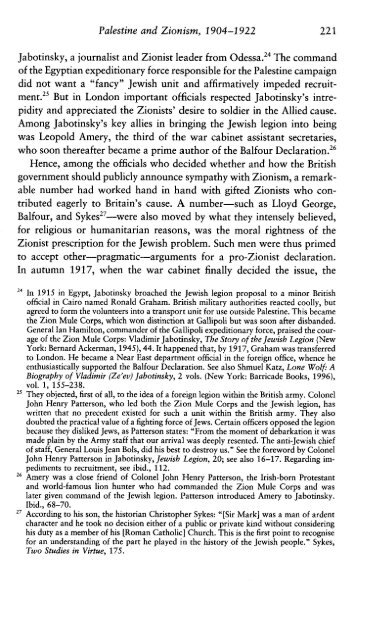Churchill, Palestine and Zionism, 1904-1922 - Douglas J. Feith
Churchill, Palestine and Zionism, 1904-1922 - Douglas J. Feith
Churchill, Palestine and Zionism, 1904-1922 - Douglas J. Feith
You also want an ePaper? Increase the reach of your titles
YUMPU automatically turns print PDFs into web optimized ePapers that Google loves.
<strong>Palestine</strong> <strong>and</strong> <strong>Zionism</strong>, <strong>1904</strong>-<strong>1922</strong> 221<br />
Jabotinsky, a journalist <strong>and</strong> Zionist leader from Odessa. 24 The comm<strong>and</strong><br />
of the Egyptian expeditionary force responsible for the <strong>Palestine</strong> campaign<br />
did not want a "fancy" Jewish unit <strong>and</strong> affirmatively impeded recruitment.<br />
25 But in London important officials respected Jabotinsky's intrepidity<br />
<strong>and</strong> appreciated the Zionists' desire to soldier in the Allied cause.<br />
Among Jabotinsky's key allies in bringing the Jewish legion into being<br />
was Leopold Amery, the third of the war cabinet assistant secretaries,<br />
who soon thereafter became a prime author of the Balfour Declaration. 26<br />
Hence, among the officials who decided whether <strong>and</strong> how the British<br />
government should publicly announce sympathy with <strong>Zionism</strong>, a remarkable<br />
number had worked h<strong>and</strong> in h<strong>and</strong> with gifted Zionists who contributed<br />
eagerly to Britain's cause. A number-such as Lloyd George,<br />
Balfour, <strong>and</strong> Sykes27 Jabotinsky, a journalist <strong>and</strong> Zionist leader from Odessa.<br />
-were also moved by what they intensely believed,<br />
for religious or humanitarian reasons, was the moral rightness of the<br />
Zionist prescription for the Jewish problem. Such men were thus primed<br />
to accept other-pragmatic-arguments for a pro-Zionist declaration.<br />
In autumn 1917, when the war cabinet finally decided the issue, the<br />
24 The comm<strong>and</strong><br />
of the Egyptian expeditionary force responsible for the <strong>Palestine</strong> campaign<br />
did not want a "fancy" Jewish unit <strong>and</strong> affirmatively impeded recruitment.<br />
25 But in London important officials respected Jabotinsky's intrepidity<br />
<strong>and</strong> appreciated the Zionists' desire to soldier in the Allied cause.<br />
Among Jabotinsky's key allies in bringing the Jewish legion into being<br />
was Leopold Amery, the third of the war cabinet assistant secretaries,<br />
who soon thereafter became a prime author of the Balfour Declaration. 26<br />
Hence, among the officials who decided whether <strong>and</strong> how the British<br />
government should publicly announce sympathy with <strong>Zionism</strong>, a remarkable<br />
number had worked h<strong>and</strong> in h<strong>and</strong> with gifted Zionists who contributed<br />
eagerly to Britain's cause. A number-such as Lloyd George,<br />
Balfour, <strong>and</strong> Sykes27-were also moved by what they intensely believed,<br />
for religious or humanitarian reasons, was the moral rightness of the<br />
Zionist prescription for the Jewish problem. Such men were thus primed<br />
to accept other-pragmatic-arguments for a pro-Zionist declaration.<br />
In autumn 1917, when the war cabinet finally decided the issue, the<br />
14 In 1915 in Egypt, Jabotinsky broached the Jewish legion proposal to a minor British<br />
official in Cairo named Ronald Graham. British military authorities reacted coolly, but<br />
agreed to form the volunteers into a transport unit for use outside <strong>Palestine</strong>. This became<br />
the Zion Mule Corps, which won distinction at Gallipoli but was soon after disb<strong>and</strong>ed.<br />
General Ian Hamilton, comm<strong>and</strong>er of the Gallipoli expeditionary force, praised the courage<br />
of the Zion Mule Corps: Vladimir Jabotinsky, The Story of the jewish Legion (New<br />
York: Bernard Ackerman, 1945),44. It happened that, by 1917, Graham was transferred<br />
to London. He became a Near East department official in the foreign office, whence he<br />
enthusiastically supported the Balfour Declaration. See also Shmuel Katz, Lone Wolf: A<br />
Biography of Vladimir (Ze'evJ jabotinsky, 2 vols. (New York: Barricade Books, 1996),<br />
vol. 1, 155-238.<br />
25 They objected, first of all, to the idea of a foreign legion within the British army. Colonel<br />
John Henry Patterson, who led both the Zion Mule Corps <strong>and</strong> the Jewish legion, has<br />
written that no precedent existed for such a unit within the British army. They also<br />
doubted the practical value of a fighting force of Jews. Certain officers opposed the legion<br />
because they disliked Jews, as Patterson states: "From the moment of debarkation it was<br />
made plain by the Army staff that our arrival was deeply resented. The anti-Jewish chief<br />
of staff, General Louis Jean Bois, did his best to destroy us." See the foreword by Colonel<br />
John Henry Patterson in Jabotinsky, jewish Legion, 20; see also 16-17. Regarding impediments<br />
to recruitment, see ibid., 112.<br />
26 Amery was a close friend of Colonel John Henry Patterson, the Irish-born Protestant<br />
<strong>and</strong> world-famous lion hunter who had comm<strong>and</strong>ed the Zion Mule Corps <strong>and</strong> was<br />
later given comm<strong>and</strong> of the Jewish legion. Patterson introduced Amery to Jabotinsky.<br />
Ibid., 68-70.<br />
27 According to his son, the historian Christopher Sykes: "[Sir Mark] was a man of ardent<br />
character <strong>and</strong> he took no decision either of a public or private kind without considering<br />
his duty as a member of his [Roman Catholic 1 Church. This is the first point to recognise<br />
for an underst<strong>and</strong>ing of the part he played in the history of the Jewish people." Sykes,<br />
Two Studies in Virtue, 175.


